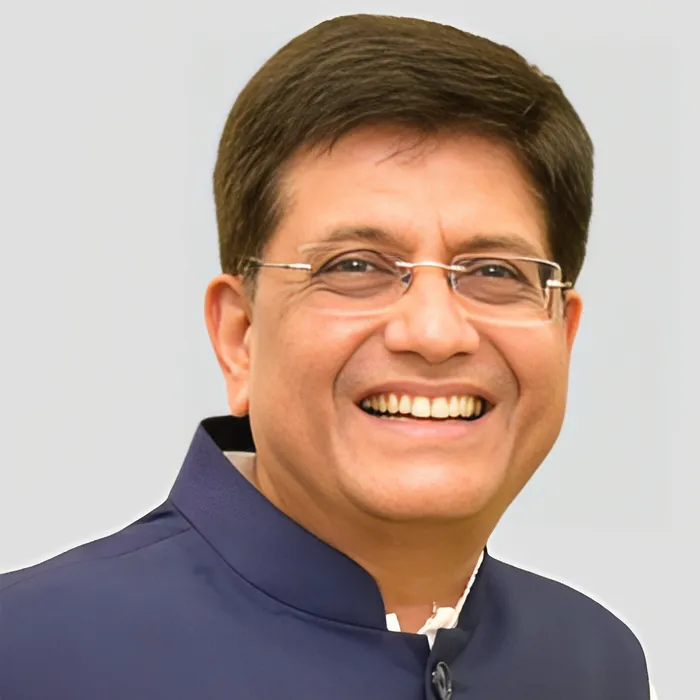India and Africa's renewable energy partnership: A G20 perspective

Union Minister of Commerce and Industry, Consumer Affairs, Food and Public Distribution and Textiles, Piyush Goyal.
Image: Supplied
Indian and African governments have forged a robust and multifaceted partnership encompassing trade, investment, and a wide range of developmental initiatives—spanning agriculture and food processing, energy and infrastructure, healthcare and pharma, IT and telecommunications, manufacturing and education and skill development.
India and Africa possess significant potential for collaboration in the green economy sector, particularly in renewable energy and sustainable agriculture. India's expertise in areas like solar and wind energy, digital public infrastructure, and agricultural technology can be leveraged to support Africa's green transition and achieve shared development goals. Both regions can partner to harness green hydrogen’s potential by combining Africa’s vast renewable resources with India’s cost-efficient technology and policy expertise.
The G20 Summit, which has South Africa at its presidency this year and will culminate in the Leader’s Summit in Johannesburg in November, includes the critical component of the just energy transition.
G20 members have endorsed voluntary principles to promote clean, sustainable, just, affordable and inclusive energy transitions in line with SDG 7, the Paris Agreement and the "Outcome of the First Global Stocktake" adopted at the 28th UN Climate Change Conference.
By sharing technology and policy expertise, India can support Africa’s renewable expansion and crucially, joint efforts can accelerate clean energy adoption, enhance energy security, and advance global decarbonisation goals. Africa’s vast natural resources contribute to India’s energy security, while India’s investments, technological know-how, and policy experience support Africa’s efforts to address energy poverty.
This collaboration covers a broad range—including oil and gas, renewable energy, including solar, and emerging areas such as green hydrogen—creating significant opportunities for sustainable and inclusive energy development across both regions.
Union Minister of Commerce and Industry, Consumer Affairs, Food and Public Distribution and Textiles, Piyush Goyal has stressed that India and Africa are uniquely poised to become the leaders in production of renewable energy and that the India-Africa relationship has the potential to help fulfil dreams and aspirations of around a third of the world’s population.
He said that both India and Africa are blessed with demographic dividend and with skill development and education of youth, this partnership can drive the global progress in this century.
While delivering the Keynote Address at the 18th CII-EXIM Bank Conclave on ‘India-Africa Growth Partnership’ in New Delhi in 2023, Goyal stressed collaboration between India and Africa in the field of renewable energy to make the dream of “One World, One Grid” come true.
He said that especially solar energy with interconnected grids through overland and underwater transmission lines. Goyal said that this potential of affordable energy for all throughout the day must be leveraged effectively and praised the participation of more than 20 African countries in the International Solar Alliance (ISA).
India is increasingly turning to Africa as a strategic partner in its efforts to diversify energy sources and secure future supply. This growing engagement reflects Africa’s strategic position within the G20 framework, as the continent continues to strengthen ties with G20 countries and solidify its role as a key partner in global energy security.
Some key highlights on further energy collaboration:
-India’s experience in renewable energy aligns with Africa’s sustainable energy goals, encouraging joint environmentally friendly energy initiatives.
-Solar and wind energy projects, especially in East and Southern Africa, are ripe for investment by Indian engineering, procurement and construction and technology firms.
-Indian firms can contribute to Africa’s connectivity goals through the provision of financing for roads, ports, and other critical infrastructure.
-The GCC’s energy transition and infrastructure expansion present Indian investors with large-scale opportunities in renewables, hydrogen, transport, and smart cities.
-Indian Engineering, Procurement, and Construction (EPC) and technology providers bring cost-competitive expertise and scalable technology solutions.
India’s investments in Africa include the ONGC (Oil and Natural Gas Corporation) sanctioned $175 million loan to support the Area 1 Mozambique Project. Three Indian state-run companies – ONGC Videsh, Bharat Petroleum Corporation Ltd. (BPCL) and Oil India Ltd – hold a combined 30% stake in the project.
In December 2024, BPCL announced plans to invest approximately $32.9 billion on its exploration and production blocks in Mozambique and Brazil. India has also invested in Nigeria, where it has been involved in small-scale refining opportunities, including a chemicals and fertilizer plant, and made a $14 billion investment pledge in 2023.
In response to this strategic shift, the Nigerian National Petroleum Corporation has urged Indian investors to capitalise on opportunities in Nigeria’s oil and gas sector, especially in refining and natural gas.
In addition to fossil fuels, Indian companies are positioning themselves as key players in Africa’s energy transition to renewable sources.
Egypt is currently in discussions with Indian renewable energy company ReNew Energy to develop a $8 billion green hydrogen project in the Suez Canal Economic Zone, aiming to produce 220,000 tons of green hydrogen annually upon completion and establish Egypt as a regional clean energy hub.
Meanwhile, the ISA’s Global Solar Facility – which aims to provide clean energy access to 200 million Africans by 2030 – recently received a $25 million funding boost from the Indian government.
ISA is working to replicate India’s solar energy success across Africa, with 30 solar-focused projects currently under development across the continent.
* Dr Govender is an academic and a keen observer of issues related to international relations.
** The views expressed do not necessarily reflect the views of IOL or Independent Media.